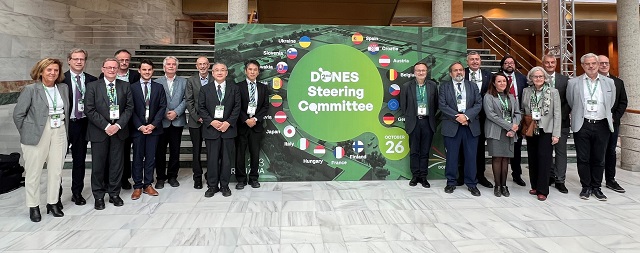- Published : 27.10.2023.
DONES Steering Committee supports the ramp-up of the IFMIF-DONES international team

The second DONES Steering Committee, the highest governing body of the DONES Fusion Programme, has met in Granada on 26th October to review the progress of the programme, in particular the results of the panel of independent experts that analysed the current state of the DONES baseline.
The preliminary review report of the experts panel recommends the setting up without delay of the international team (Programme Team) to progress in the construction of the particle accelerator being built in Escúzar (Granada).
The Committee held today at the Palacio de Congresos in Granada was attended by representatives of 17 countries, as well as the European Commission on behalf of EURATOM, the consortium of European fusion laboratories (EUROfusion) and Fusion for Energy (F4E). Ukraine has also participated for the first time to this board meeting.
In addition, the DONES Steering Committee has discussed the accomplishments reached since the first Steering Committee meeting held in Granada on 16 March 2023.
In parallel, the representatives have reviewed several activities to accelerate the project, such as the basis of the Programme Plan and the procedures for selecting key profiles for the programme implementation, namely the Programme Manager and the Chief Engineer. The Committee has also been updated on the current status of the discussions with interested countries to define their participation.
Finally, a representative of the Spanish Nuclear Safety Council presented the safety and regulatory framework applicable to the IFMIF-DONES project.
The next meeting of the DONES Steering Committee will be held in the Croatian city of Zadar in March 2024.
At this second meeting, the Committee was attended by representatives from:
DONES Programme Background
Fusion energy has been one of humanity’s most significant scientific challenges since the 1950s. It is a safe, sustainable and massive energy source based on an inexhaustible fuel distributed throughout the planet, which could meet the energy needs in the second half of this century. This objective will materialise in the future European demonstration power plant, DEMO (DEMOnstration power plant). This plant will confirm the technological and economic feasibility of fusion energy, with continuous operation and injection of energy into the electricity grid. To do this, DEMO needs to build on all the development acquired in ITER and the Fusion Programme, but it also requires the most critical materials of its internal structure to be tested.
One of the key challenges in realising fusion energy is the development of neutron-tolerant materials that can withstand a neutron flux of up to 14 MeV while maintaining good physical and structural properties for extended periods. Currently, engineering materials data, properties and rules are based on fission neutron irradiation campaigns and do not fully cover neutron energies, temperature and other operating conditions.
The mission of the DONES programme will be to develop a database of the effects on materials of neutron irradiation similar to those produced in fusion reactions, which is essential for the design and construction of future fusion reactors. Therefore, to test materials and grow this knowledge, it is necessary to develop a neutron source with a spectrum similar to that of fusion; this neutron source will be able to reproduce the irradiation conditions of future fusion reactors, is IFMIF-DONES.
The IFMIF-DONES scientific infrastructure is the central element of the DONES Programme, which aims to establish a comprehensive database on fusion materials.
In IFMIF-DONES, a particle accelerator will produce a deuteron beam (D+) of 125 mA current and 40 MeV energy, impacting a 25 mm thick liquid lithium curtain flowing at 15 m/s. The reactions in the lithium target, upon the impact of the deuteron beam, will generate a high-energy neutron flux of sufficient intensity to simulate, in an accelerated manner, the damage that neutrons would produce in a fusion reactor. This neutron flux will be used to irradiate material samples located immediately behind the lithium curtain in the test modules of the irradiation area.
About IFMIF-DONES
The International Fusion Materials Irradiation Facility: Demo Oriented NEutron Source (IFMIF-DONES) is a unique scientific infrastructure in the world where materials for future fusion power plants will be tested, validated and qualified as DEMO (a prototype demonstration fusion reactor).
About this international project, in December 2017, Fusion for Energy (F4E) positively assessed the joint Spanish and Croatian proposal to locate IFMIF-DONES in Granada.
The European Strategy Forum on Research Infrastructures (ESFRI) included IFMIF-DONES in its 2018 Roadmap as a project within the energy area, and it currently appears in the 2021 Roadmap. IFMIF-DONES thus becomes one of ESFRI’s critical infrastructures, positioning itself as a relevant strategic infrastructure for European scientists in energy research and innovation.
IFMIF-DONES will therefore be a unique international facility. In addition to its relevance for the development of fusion as an energy source, it will also be very relevant in other areas of research and knowledge that will benefit from its technology, such as medicine, particle physics, fundamental physics studies, and industry… All this is on a planet that is increasingly committed to sustainable development and using clean, safe and efficient energy.
The IFMIF-DONES project is an initiative of the National Fusion Laboratory of the Energy, Environmental and Technological Research Centre (CIEMAT), which the IFMIF-DONES España Consortium is currently developing.
The IFMIF-DONES España Consortium is a research entity shared equally between the General State Administration and the Autonomous Community of Andalusia.
https://ifmif-dones.es